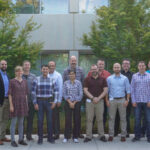|
|
This video is part of the appearance, “Automation Anywhere Presents at Tech Field Day 19“. It was recorded as part of Tech Field Day 19 at 9:00-12:00 on June 27, 2019.
Watch on YouTube
Watch on Vimeo
Steve Van Lare, Head of Cognitive Solutions at Automation Anywhere, introduces the concept of AI-augmented Robotic Process Automation (RPA) in a presentation at Tech Field Day 19. Van Lare underscores that RPA is the top delivery vehicle for AI, particularly when incorporating cognitive aspects that allow software to learn and improve over time. He highlights that Automation Anywhere’s RPA system is open and highly integrative, allowing seamless connection with other AI tools and platforms such as Google AI and Microsoft’s cognitive tools. One of the flagship products discussed is the IQ Bot, a cognitive tool designed to process documents, adapting and learning from new data continuously.
Van Lare elaborates on the architecture that underpins AI-augmented RPA solutions at Automation Anywhere, emphasizing how RPA facilitates the integration and deployment of AI components. He describes how custom-built tools and third-party solutions can be assembled into complete RPA skills, covering a range of functionalities like image recognition, NLP, and data extraction. By enabling business users to upload sample documents and train AI models without needing extensive technical expertise, these solutions streamline previously manual and repetitive tasks into automated workflows. For example, the IQ Bot can transform shipping and billing documents into structured data that can be easily inputted into enterprise systems like SAP or Oracle.
The presentation also touches on the flexibility and deployment strategies of AI skills within RPA frameworks. Van Lare mentions the efficiency of RPA in handling both the intensive training phase, often carried out on high-power GPU systems, and the execution phase, which can happen on less powerful, distributed devices. Furthermore, the Bot Store allows distribution and reuse of these trained AI models, ensuring broad accessibility and ease of deployment. A case study involving mortgage applications illustrates how these AI-augmented RPA systems can significantly enhance efficiency by automating straightforward cases while allowing human agents to focus on more complex decisions, thereby optimizing overall operational productivity.
Personnel: Steve Van Lare









